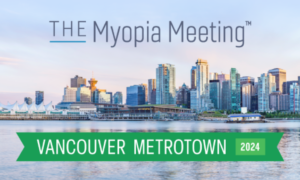April 15, 2019
By Dwight Akerman, OD, MBA, FAAO
Chief Medical Editor, Review of Myopia Management
Parents, especially mothers, are critical health care decision-makers for their children. This study demonstrates the lack of parental recognition of the risks for eye disease and vision loss associated with myopia and the lack of parental concern related to a diagnosis of childhood myopia.
Of 329 participating Irish parents, just 46% considered that myopia presented an eye health risk to their children, while an identical number (46%) regarded it as merely an optical inconvenience. Only 14% of parents expressed concern if their child were to be diagnosed with myopia. Although this study was conducted only in Ireland, it is reasonable to assume the results and conclusions apply to other Western countries. Further research will need to be performed in Asian countries to validate that the findings apply to parents and children in that region of the world.
Practitioners, patients, and parents generally consider myopia effectively managed through the simple correction of the refractive error, typically using spectacles. The lifestyle, optical, and pharmacologic interventions required to prevent and control myopia are likely to be substantially more burdensome to parents. Therefore, the arguments in favor of myopia management will need to be comprehensively and clearly made to parents and children alike to ensure the strategies are broadly accepted and successfully implemented.
Consumer awareness of myopia, its causes, potential eye health consequences, and treatment options will help motivate parents to actively prevent and treat myopia rather than to correct blurred distance vision passively.
Parental attitudes to myopia: a key agent of change for myopia control?
McCrann, S., Flitcroft, I., Lalor, K., Butler, J., Bush, A., & Loughman, J.
Abstract
Purpose: With the increasing prevalence in myopia there is growing interest in active myopia prevention. This study aims to increase our understanding of parental attitudes to myopia development and control, as a means to inform future health planning and policy. It evaluates, for the first time, the attitude of parents to myopia and its associated risks, as well as assessing the exposure of Irish children to environmental factors that may influence their risk profile for myopia development.
Methods: Parents of children ages eight to 13 in eight participating schools completed a questionnaire designed to assess their knowledge of and attitudes towards myopia and its risk factors. A structured diary was also used to capture daily activities of children in relation to myopia risk factors.
Results: Of 329 parents, just 46% considered that myopia presented a health risk to their children, while an identical number (46%) regarded it as an optical inconvenience. Myopia was also, but less frequently, considered an expense (31% of parents), a cosmetic inconvenience (14% of parents) and, by some, as a sign of intelligence (4% of parents) 76% of parents recognised the potential of digital technology to impact the eye, particularly as a cause of eyestrain and need for spectacles. Only 14% of parents expressed concern should their child be diagnosed with myopia. Compared to nonmyopic parents, myopic parents viewed myopia as more of an optical inconvenience (p < 0.001), an expense (p < 0.005) and a cosmetic inconvenience (p < 0.001). There was a trend for myopic parents to limit screen-time use in their household more than nonmyopic parents (p = 0.05). Parents who considered myopia a health risk sought to limit screen time more than parents who did not regard myopia as a health risk to their child (p = 0.01). Children spent significantly longer performing indoor proximal tasks (255 min) compared to time spent outdoors (180 min; p < 0.0001) daily. Older (p = 0.001), urban (p = 0.0005) myopic (=0.04) children spent significantly more time at digital screens compared to younger nonmyopic children from a rural background.
Conclusion: Parental attitudes to myopia were typically nonchalant in relation to health risk. This is of particular concern given the impact parents have on children’s behaviour and choices with respect to such risk factors, demonstrating an acute need for societal sensitisation to the public health importance of myopia.
Source: McCrann, S., Flitcroft, I., Lalor, K., Butler, J., Bush, A., & Loughman, J. (2018). Parental attitudes to myopia: a key agent of change for myopia control?. Ophthalmic and Physiological Optics, 38(3), 298-308.













